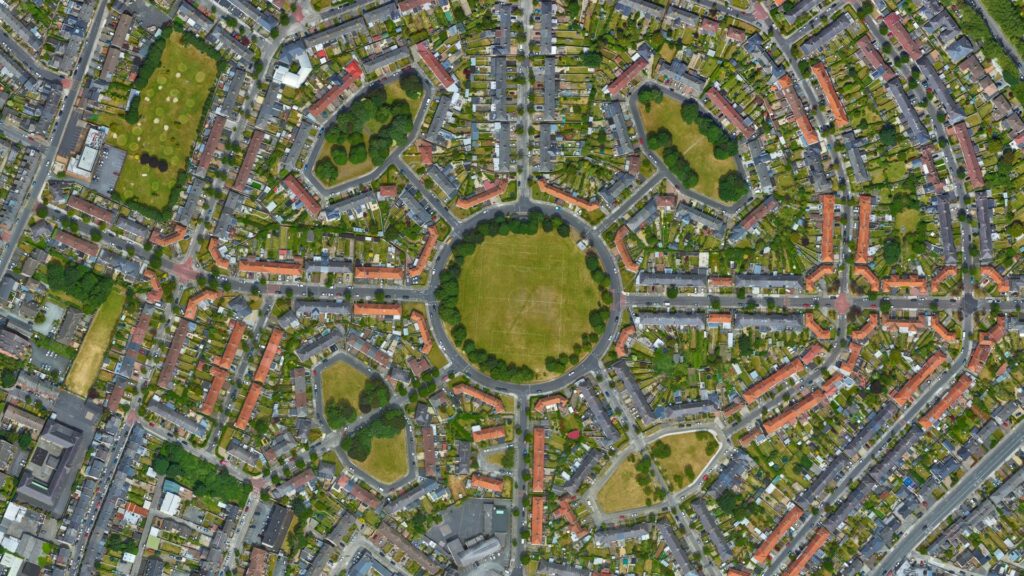A charismatic revolution? The growth of Pentecostalism in Ireland
A charismatic revolution? The growth of Pentecostalism in Ireland
Pentecostal and charismatic churches have grown in popularity on the isle of Ireland in the past 30 years.
For hundreds of years, religion in Northern Ireland and the Republic of Ireland has been dominated by the dichotomy between Catholicism and Protestantism. In the past and particularly during the Troubles,[1] each citizen belonged to only one denomination. How they identified themselves religiously was one of the most important societal indicators.[2] In 1971, the Irish population fitted into three main Christian denominations: Catholic, Church of Ireland, or Presbyterian.[3] [4] While this distinction persists in both countries over 50 years later, shifts in the demographic of Northern Ireland and the Republic of Ireland over the past 30 years have led to the growth of different Christian denominations.
In particular, as some move away from the Catholic-Protestant dichotomy, Pentecostal Christianity is becoming increasingly popular. This article will outline the reasons behind the rise in Pentecostal churches in both Northern Ireland and the Republic of Ireland (henceforth referred to as the North and the Republic) and what impact this has had on the traditional dichotomy.
What is Pentecostalism?
Before looking at the rise of Pentecostal churches in the North and the Republic, it is important to firstly outline the key beliefs and practices of this Christian denomination. While there are some differences, there are many similarities amongst the theologies and practices of Pentecostal and Charismatic churches.
Both denominations are branches of the Protestant Church and were founded in the USA in the early to mid-20th century.[5] Theologically, both churches emphasise a personal experience of God through baptism of the Holy Spirit. The main difference between them is that ‘Pentecostals have their own denominations and churches, while charismatics belong to historic denominations, such as Lutheranism, Baptist, or Presbyterianism’.[6] While both denominations exist in the North and the Republic, this article will focus specifically on the growth of Pentecostalism.
Demographic changes
As already noted, religious affiliation in the North and the Republic was historically overwhelmingly Christian, with the majority of citizens identifying as either Catholic, Church of Ireland, or Presbyterian. However, since the mid-1990s, the demographics of both countries have shifted which has impacted religious affiliation. A period of rapid economic growth in the Republic (known as the Celtic Tiger) between the mid-1990s and late 2000s, contributed to a change in outlook of many Irish citizens. Moreover, in both the North and the Republic, increasing globalisation led to growth in Eastern European, Chinese, and African migrants.[7] [8] These changes were reflected in the 2016 Republic of Ireland census, where 17% of Irish residents were born abroad.[9]
Shifting religiosity
But why has Pentecostalism in particular grown in the North and the Republic? Firstly, the arrival of migrants from around the world impacted the cultural and religious identity of both countries.
Very popular in some African and Eastern European countries, many new migrants were already members of Pentecostal churches.[10] Therefore, a handful of church leaders in the North and the Republic saw an opportunity to develop new Pentecostal churches which would already have access to enthusiastic congregants.[11] Nick Park, executive director of Evangelical Alliance Ireland, refers to this demographic as the ‘new Irish’ and explains that for Christian denominations that “lay a large stress on personal choice and decision,” an increase in diversity is “good news.”[12] At present, there are several Pentecostal congregations of mixed ethnicity in the North and the Republic.[13] The Redeemed Christian Church of God, a denomination founded in Nigeria, has been particularly successful and, as of 2017, had over 100 congregations in the Republic.[14]
Secondly, Park suggests that “increased secularisation provides an environment in which such churches thrive.”[15] While Pentecostal churches have a high number of ethnically diverse congregants, it is not just the ‘new Irish’ who are participating in this “religious revolution.”[16] As Catholic and Protestant affiliation has declined in the North and the Republic (in the 2016 census, ‘No Religion’ was the second largest group),[17] a gap has been left. Gary Davidson, leader of the Assemblies of God Ireland (AGI), believes that “the respect people would have held for God and the Roman Catholic Church is not there to the extent that it was … there is a huge moral vacuum in the nation.”[18] Davidson is sure that this vacuum can be filled by Pentecostalism.
Thirdly, Gladys Ganiel, sociologist of religion, explains that one reason behind the impressive growth of these denominations across the isle of Ireland is “the ability of these churches to adapt so well to their local contexts.”[19] Because, at their core, they are driven by their “reliance on the leading of the Holy Spirit,” they do not face the same problem that some other ‘old’ churches do, restricted by tradition and hierarchy.[20] Moreover, these Pentecostal churches have never been part of the ‘political or cultural power structures’[21] in the North of the Republic and thus have greater flexibility.
Evolution or revolution?
It is clear that the growth of Pentecostal churches in the North and the Republic of Ireland can be greatly attributed to impacts of globalisation. However, the growth has been facilitated by the declining role of other Christian denominations in both countries, in particular Catholicism. When interviewing members of AGI, Ganiel notes how “often they [congregants] described their own faith in contrast to Catholicism.”[22] For many native members of Pentecostal churches in the North and the Republic, their affiliation to the churches is greatly shaped by a need to be set apart and distanced from any association with the Catholic Church.
While the growth of these denominations is not (yet) revolutionary, Ganiel notes that Pentecostal churches are “now noticeable actors” in the North and the Republic.[23] Their growth is shaping the religious landscape of both countries and bucking the trend of secularisation. There is no doubt that such denominations will contribute to the future of religion in Northern Ireland and the Republic of Ireland.
Want to learn more about similar topics? Go to the EARS Dashboard and receive weekly updates.
Sources
[1] This sectarian conflict occurred between Unionists, who were mostly Ulster Protestants and wanted Northern Ireland to remain within the UK, and Irish nationalists, who were mostly Irish Catholics and wanted Northern Ireland to leave the UK and join a united Ireland (the Troubles | Summary, Causes, & Facts)
[2] Two tribes: A divided Northern Ireland
[3] Both the Church of Ireland and Presbyterianism are Protestant Christian denominations
[4] Census 1971 Volume 9 – Religion – CSO – Central Statistics Office
[5] Pentecostalism vs Charismatic Movement: What’s the Difference? – Christianity FAQ
[6] Pentecostalism vs Charismatic Movement: What’s the Difference? – Christianity FAQ
[7] Central and Eastern European Migrants (administrative geographies)
[8] Irish Economy Attracts Eastern European Immigrants
[9] Ireland sees 73% increase in number of non-believers – National Secular Society
[10] Evangelical, Pentecostal and Charismatic Churches in Latin America and Eastern Europe: an Introduction
[11] Charismatic Churches See Growth, Miracles in Ireland — Charisma Magazine
[12] A religious revolution is taking place in Ireland
[13] PENTECOSTAL CHURCHES (ALSO KNOWN AS PENTECOSTALISM)
[14] A religious revolution is taking place in Ireland
[15] A religious revolution is taking place in Ireland
[16] A religious revolution is taking place in Ireland
[17] Census of Population 2016 – Profile 8 Irish Travellers, Ethnicity and Religion
[18] Charismatic Churches See Growth, Miracles in Ireland — Charisma Magazine
[19] Telling the Story of Pentecostals and Charismatics in Northern Ireland: Tomorrow on Radio Ulster – Gladys Ganiel
[20] Telling the Story of Pentecostals and Charismatics in Northern Ireland: Tomorrow on Radio Ulster – Gladys Ganiel
[21] A religious revolution is taking place in Ireland
[22] A charismatic church in a post-Catholic Ireland: negotiating diversity at Abundant Life in Limerick City – Gladys Ganiel, 2016






